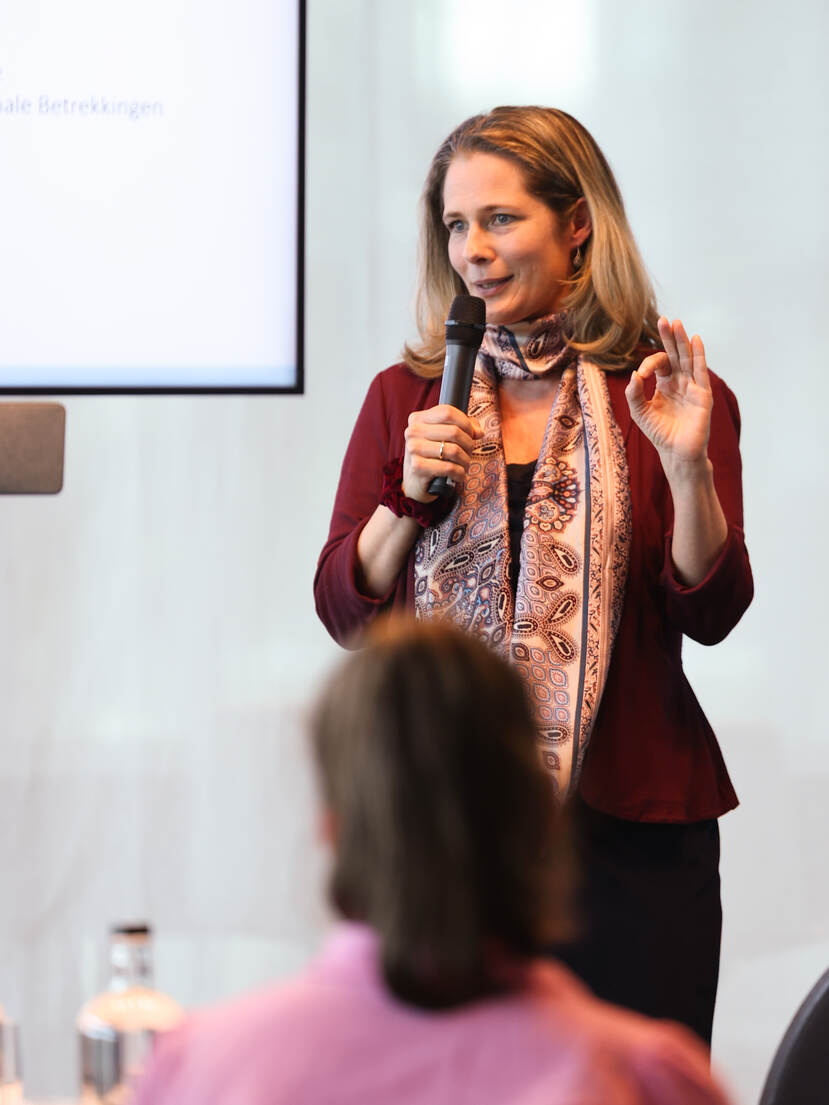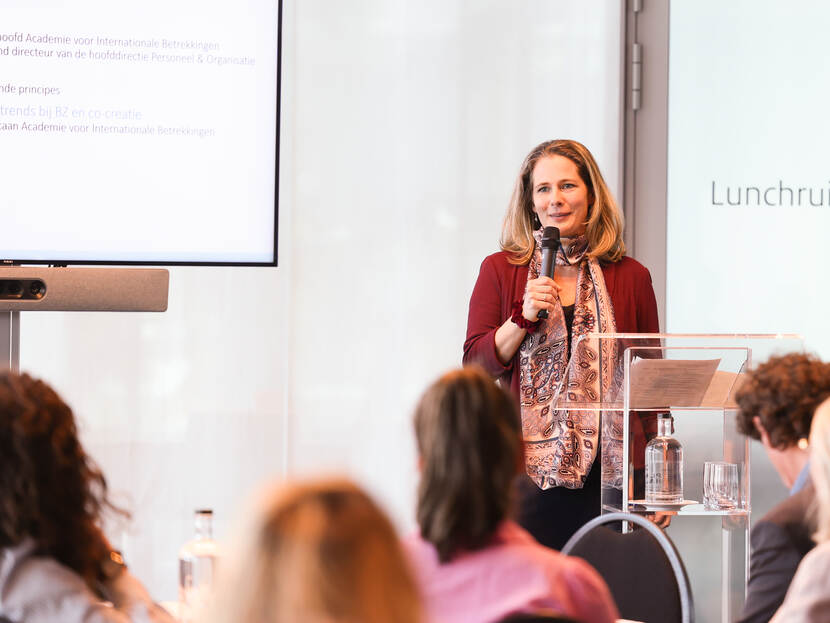Linking diplomacy with the world of knowledge
Marije Balt was appointed Dean of the Academy for International Relations in September 2024. She acts as a sounding board for strategy development and is working to strengthen the ties between diplomacy and academia. As Dean, she is also committed to supporting staff, including diplomats, in keeping up with the fast pace of developments, through adaptability and agility.
Connecting different worlds
‘My role as Dean of the Academy combines my experience as a diplomat, policy evaluator and strategic adviser, university lecturer and researcher,’ Marije explains. ‘I’m inquisitive and want to understand how people think. During my career I’ve worked in various professional settings, each with its own working culture and dynamics. I’m now well acquainted with three settings and want to connect at least two of them: the diplomatic world and academia.’
Partnering with the Academy
Marije is currently working as Chief Science Officer for BZ with the Strategic Policy Unit (ESA). ESA aims to make Dutch foreign policy more resilient in the long term, as well as knowledge-based, externally focused and coherent. ‘I identify strategic issues at BZ, now and in the future,’ Marije says. ‘Through strategic foresight but also by studying current developments from a historical perspective. Identifying strategic policy aims is part of our daily work. Together with the Academy team we discuss which topics need to be addressed. One example is tech diplomacy: some years ago we ran a learning activity on this subject, long before everyone started talking about Elon Musk’s geopolitical role. We closely follow current affairs and adapt our learning activities and speakers accordingly.’

Adaptability
‘Equipping diplomats to respond more effectively in today’s fast-changing world: that’s my goal as Dean of the Academy,’ says Marije. ‘It’s extremely demanding for diplomats to adopt a different attitude and also adapt to these turbulent times. Now that the playing field for the Netherlands is shrinking and becoming more unpredictable, the knowledge and skills of our staff worldwide are indispensable for promoting Dutch interests abroad.’
Switching faster
‘We need to change our thinking. “Business as usual” won’t do anymore. We need to forge new partnerships and find new ways to engage with emerging powers. That includes reinventing ourselves as professionals. Diplomats working at the missions, where we’re confronted with ourselves, have a key role to play in this shift. We need to be able to switch much faster to a different mode and adopt a different attitude. That’s something we do together by learning from each other.’
Diplomacy is a profession
‘You can’t learn diplomacy from books. It’s about social behaviour – something we learn from our peers. The Academy connects that knowhow and staff within BZ, government-wide and worldwide, with the help of a robust digital infrastructure that caters for the learning needs of internal and external players alike. The hybrid learning activity ‘Effective diplomacy: from Fingerspitzengefühl to practical impact’, part of the BenUT (Policy and Implementation Follow-Up Days), is a fine example of learning diplomatic tricks of the trade from peers,’ Marije concludes.

Diplomacy at home
‘BZ has a good reputation with the Dutch public, and that’s something we need to cherish. Staff could practise talking about their work, giving the public an idea of the complexity of working in another culture, with people who have totally different attitudes and opinions, in a different language. For example, as a teacher I like to use simulations. And during a simulation I may suddenly switch into French! Then everyone has to improvise. It shows what it’s like to be working for the Netherlands in and with a foreign country and culture.’
We can’t know everything
‘It’s tremendously important for BZ to work in partnership with the academic community. Our diplomats are making connections all over the world, but we don’t have all the answers ourselves. Scholars have a different language and perspective – the academic community is a world of its own. At BZ we need more people who can build bridges to the worlds of knowledge, research and policymaking. That’s why BZ offers financial support to a special scheme for staff who want to do PhD research.’
Stronger together
‘Not only BZ but also the line ministries need to keep investing in diplomatic knowledge and expertise in this rapidly changing international context. The Policy and Operations Evaluation Department (IOB) concluded that the Netherlands is a relatively influential player in the EU, thanks to our high level of knowledge and experience of specific issues. This enables us to play an active, connecting role in the effective coalitions we are part of, and we also actively look for new partners. The Academy connects this sort of knowledge and knowhow and makes it available through government-wide learning activities. Through this connection, we and the line ministries can continue to work together for the Netherlands, worldwide.’
|
Marije joined the Ministry of Foreign Affairs in 2000, as a policy officer with the Permanent Representation of the Netherlands to the European Union (EU) in Brussels. In 2005 she was posted to the Dutch embassy in Nairobi. Between 2012 and 2020 she worked independently under contract as a policy evaluator at various locations in Africa, and as a university lecturer. During her work for the Advisory Council on International Affairs (AIV) she started research for her PhD, which is about EU migration policy and refugee protection in the region, using Türkiye as her case study. ‘We in Europe consider EU-Türkiye deal a success, but in Türkiye they have long since held the opposite view,’ Marije says. |